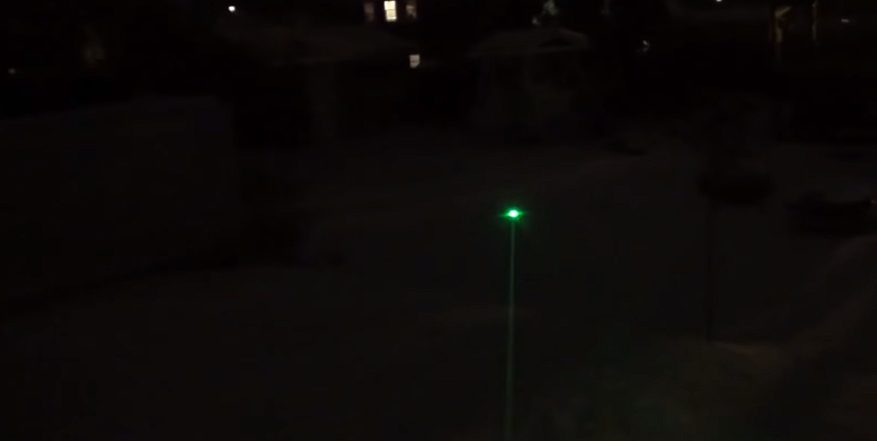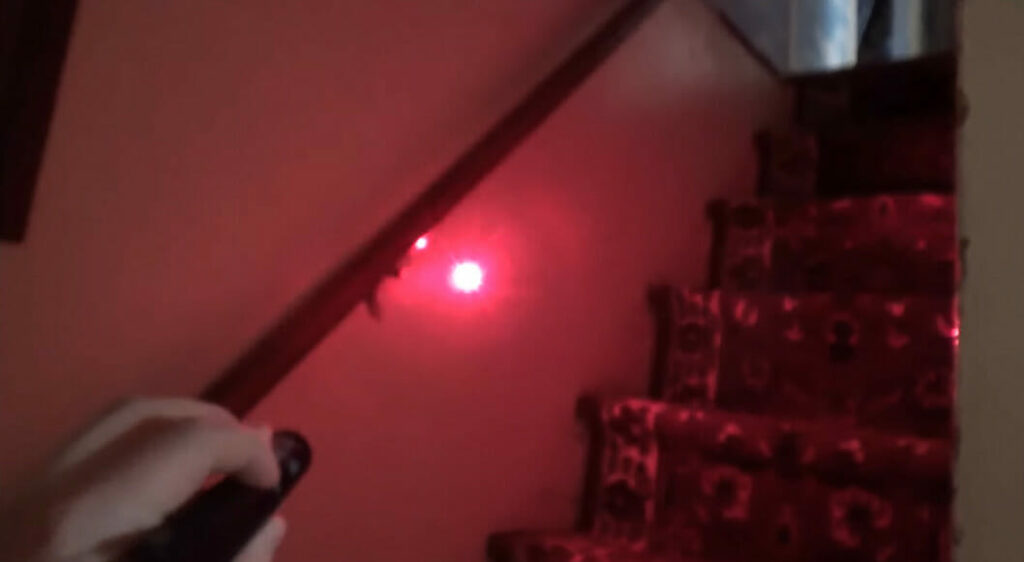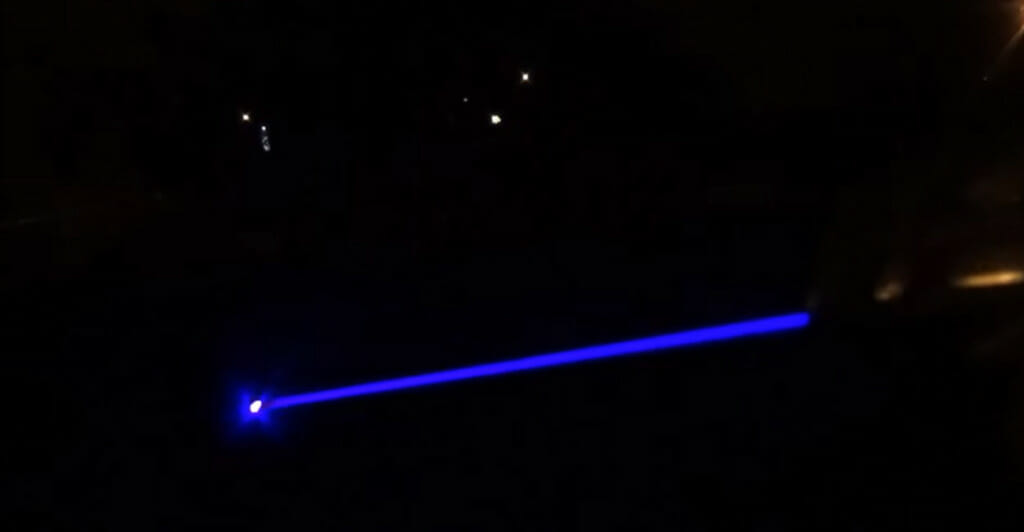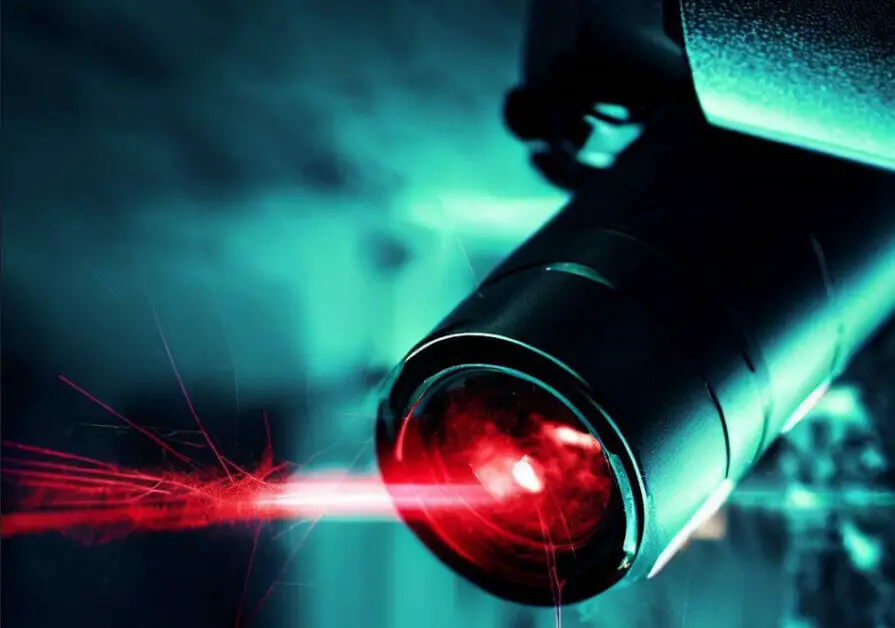I’ve always been curious if laser pointers can really damage security cameras. Being a techie, I decided to dig deeper into this topic, and guess what?
Yes, laser pointers can potentially damage security cameras. However, I learned that not all laser pointers pose a significant threat. The average laser pointers for presentations are unlikely to damage security cameras easily. However, Class 3B lasers can produce enough heat and potentially damage a camera, particularly after prolonged exposure.
In this article, we’ll explore how laser pointers can damage security cameras and the types of lasers to watch out for!
How Laser Pointers Can Affect Security Cameras

So there are mainly two ways a laser pointer could affect a security camera: Blinding and Temporary Effects and Permanent Damage. Let’s dive into each of these effects below.
Blinding and Temporary Effects
I’ve found that if someone points a laser pointer toward a security camera, it can momentarily blind the camera, making it harder to capture clear images.
However, aiming a laser at a camera from a distance can be quite challenging due to various factors, such as the power of the laser, the steadiness of the person’s hand, and the size of the camera’s lens.
Even if you blind the camera, these effects are usually temporary. Once the laser beam is removed, the security camera resumes its normal function. So, it’s not a very effective method if you’re trying to disable a camera for a long time.
Permanent Damage
Now let’s talk about the possibility of permanent damage. Class 3B lasers may produce a high light intensity to potentially damage a security camera, especially after prolonged exposure.
However, the laser pointers typically used for presentations are unlikely to damage a security camera that easily. But be aware striking or shooting a camera is far more likely to damage it than using a laser.
Many factors, such as the power of the laser beam and the sensitivity of the camera’s sensor, ultimately determine whether a laser pointer can damage a security camera. So, while possible, it’s not as easy as one might think.
To sum it up, laser pointers can temporarily and permanently affect security cameras.
But permanently damaging a camera with laser pointers is not that easy. It requires high-powered lasers, accurate aiming, and prolonged exposure to the camera’s sensor or lens.
Different Types of Laser Pointers and Their Effects
There are several color variations regarding laser pointers, but the most common are green, red, and blue lasers. Let me share with you how these laser pointers can affect security cameras.
Effects of Green Laser Pointers on Security Cameras

First, let’s talk about green laser pointers. These pointers, known for their high visibility and brightness, typically have a 490-575 nm wavelength.
Thus, a high-powered green laser pointer directed at the camera for a prolonged period can cause damage to the camera’s sensor.
This damage, known as photothermal damage, is caused by the absorption of light, which leads to a rise in temperature and can result in dead pixels in the visual feed.
Effects of Red Laser Pointers on Security Cameras

Next up are red laser pointers, which have a wavelength range of 635-750 nm. Unlike green lasers, red lasers cause less photothermal damage due to their long-wavelength light.
However, they can still potentially damage a security camera, but it’s not as easy as some might think. A red laser must be extremely powerful to generate enough energy to damage the camera.
So, for the most part, your everyday red laser pointer isn’t a major threat to security cameras.
Effects of Blue Laser Pointers on Security Cameras

Blue lasers are less discussed but deserve our attention too. They generally have shorter wavelengths than red lasers but longer than green ones—around 450 nm.
While there’s no specific information available on their potential effects on security cameras, one could speculate that the impact would likely fall somewhere between red and green laser pointers, creating a potential risk with prolonged exposure.
Factors Influencing the Damage Potential of Laser Pointers
There are a few variables regarding laser pointers and their ability to damage security cameras.
The factors that influence the damage potential of laser pointers:
- Distance: The closer the laser pointer is to the camera, the more likely it will cause damage. As the distance between the camera and the laser pointer increases, the laser’s energy disperses, reducing its impact on the sensor.
- Strength: The power of the laser pointer plays a significant role in determining the damage it may cause. Lasers with an output power of less than five milliwatts (mW) typically won’t cause permanent harm. However, lasers with a higher output (above 5 milliwatts) can potentially damage camera sensors.
- Exposure: The duration of the exposure to the laser pointer also affects the extent of the damage caused. Longer exposure to a high-powered laser could result in irreversible damage.
- Lenses: The type of lens on the security camera is another factor to consider. Some lenses might be more resilient to laser damage than others. Infrared filters and other camera accessories also affect how vulnerable a camera is.
These factors don’t operate independently; they usually work in tandem. For instance, a powerful laser pointer, used at close range and for an extended duration, will likely cause more damage than a weaker one used briefly and from a distance.
Possible Damage Types by Laser Pointers on Security Cameras
| Damage Type | Description | Causes | Effects |
|---|---|---|---|
| Photothermal Damage | Damage caused by absorption of light, leading to increased temperature | High-powered lasers, prolonged exposure | Dead pixels, blurry images, impaired functionality |
| Sensor Damage | Direct damage to the camera’s sensor causes malfunction | High-powered lasers, direct hit on the sensor, prolonged exposure | Loss of image, impaired functionality, possibly permanent damage |
| Lens Damage | Physical damage to the camera’s lens reduces its ability to capture clear images | High-powered lasers, direct hit on the lens, lack of lens protection | Blurry images, distortion, possible loss of image |
| Temporary Blindness | Temporary obstruction of the camera’s visual field by intense light | Any laser pointer aimed directly at the lens | Momentary loss of vision, no permanent damage |
Surveillance Camera Types and Their Vulnerability to Laser Pointers
As I’ve encountered different types of surveillance cameras in various setups, I wondered about their vulnerabilities, especially laser pointers.
Let’s talk a bit about some common camera types and how they might be affected by laser pointers!
- CCTV cameras are widely used for security purposes in both indoor and outdoor environments. They can be susceptible to interference from a strong, direct laser pointer beam, potentially blinding the camera or causing damage to the sensor, as mentioned in this Montavue article.
- PTZ security cameras are a step up from basic CCTV cameras. They can pan, tilt, and zoom, making them more versatile for coverage. Though more advanced, these cameras may still be affected by laser pointers. However, it’s worth noting that you’d need quite a precise aim to hit their sensors consistently as the camera moves.
- Outdoor security cameras are specifically designed for more challenging environments. They are often built with tougher materials and may be less vulnerable to laser pointers. It’s important to remember that outdoor cameras typically have more lighting, so a laser pointer may still cause temporary blindness, but permanent damage could be less likely.
So, I’ve learned that while some cameras may be vulnerable to laser pointer attacks, newer and more advanced models might avoid such threats.
Possible Legal Consequences of Using Laser Pointers on Security Cameras
Using a laser pointer on a security camera might seem like an innocent prank, but it can land you serious legal trouble.
In some situations, Showing a laser pointer at a security camera can be considered vandalism or even a criminal act. I mean, cameras are there to provide security, so intentionally disabling them is a no-no.
But let’s dive deeper into the potential legal consequences. First, you should know that authorities take this kind of action very seriously, especially in the current age where privacy and security concerns are at an all-time high.
In some countries, damaging or simply trying to disable a security camera using a laser pointer could even result in criminal charges. Yikes!
I get it; sometimes protesters use laser pointers to prevent authorities from identifying them in a crowded situation. While the intention might be to protect individuals’ privacy, it’s crucial to remember that doing so could put them at risk of legal consequences.
Okay, maybe you’re just worried about your privacy and feel like someone’s security camera intrudes on it. I feel you; I really do. But using a laser pointer to disable the camera could create more problems than it solves.
Instead, talk to the owner about your concerns or explore legal options to protect your privacy more legitly. It’s better to be safe than sorry.
Now, if someone starts shining laser pointers at security cameras just for fun, or in an attempt to cause damage, we are stepping into vandalism territory. Vandalism can lead to fines, court appearances, and even time behind bars.
So, it’s pretty clear that using a laser pointer on a security camera is not worth the potential legal headache it could cause.
Keep your laser pointer adventures to fun, innocent activities like playing with your cat or pointing out stars in the night sky. And remember, respect other people’s property and privacy – you’d want them to do the same for yours!
References
Books:
- “Introduction to Laser Technology” by C. Breck Hitz, J. J. Ewing, and Jeff Hecht.
Websites:
- Howstuffworks. https://www.howstuffworks.com/
- Physics Forums. https://www.physicsforums.com/
- Reddit: r/laser. https://www.reddit.com/r/laser/
Video Reference
XM360

